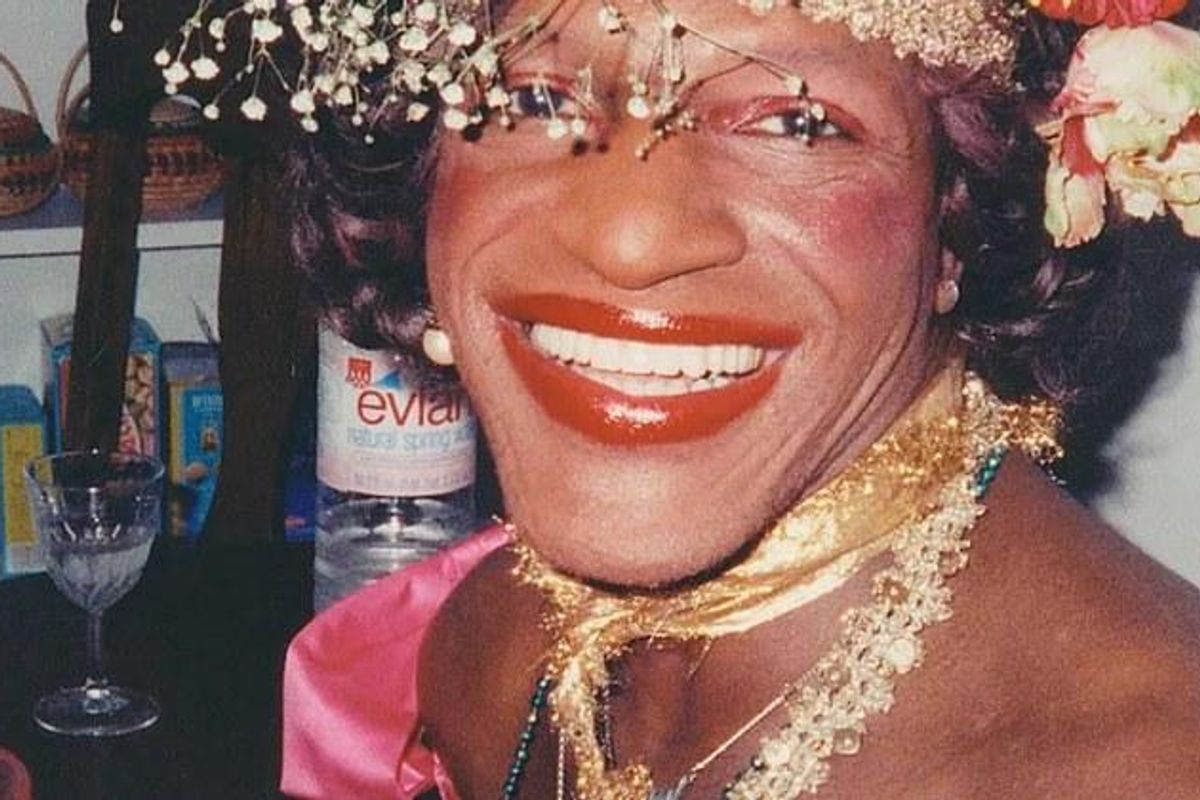Transgender Sign in Pride Parade
To begin, a quick history lesson will keep you up to date with all the work transgender people have put forth in order to help Pride month happen in the first place. The fight for LGBTQ+ rights dates back further than one usually imagines but, in particular, is typically marked by the Stonewall Riots. Led by Marsha "Pay It No Mind" Johnson, a transgender woman of color who helped the New York activist scene for over 25 years, the Stonewall Riots began on June 28th, 1969 in New York. Alongside Sylvia Riveria, a Latina trans woman, and Miss Major Griffin-Gracy, a black trans woman, Marsha P. Johnson led one of the most important queer liberations in history.
 The Death and Life of Marsha P. Johnson | petcor80 | Flickrwww.flickr.com
The Death and Life of Marsha P. Johnson | petcor80 | Flickrwww.flickr.comWhile the Riots remain a huge moment in history, many often forget those who played front-facing roles in it. Marsha was only 23 years old at the time but was a fearless, ferocious, brave leader who tackled injustice head-on in the riots. In addition to this, she was also co-founded Street Transvestite Action Revolutionaries (STAR), a shelter for homeless transgender youth; she was a big activist for the BIPOC and LGBT+ community, and STAR was revolutionary in many ways, including being the first-ever LGBT+ shelter in North America which was also the first organization in the US to be run by a trans woman of color. Marsha's contributions toward the first Pride parade preceded it by an entire year- the first pride parades came a year after the stonewall riots to commemorate it. Her legacy will live on through her acts and is celebrated by members of the LGBT+ community alike every pride.
With that out of the way, being trans during pride month can hold a lot of meaning for a lot of people, especially given the incomparable history led by transgender women that helped to shape the LBGT+ community today. Pride itself has a long history rooted in defying gender normalities and cisgender, heteronormative ideals. That, in it itself, is a lot to be proud of- let alone each individual's transgender experience that brings more color to personal pride. It is something to celebrate, our own continuation, contribution, and resistance to oppression. For those who are out as transgender, gender non-conforming, genderqueer, nonbinary, or identify anywhere outside of the cisgender binary, just being yourself and expressing your gender identity is a way of celebrating this. And it is momentous to do so! However, of course, it's not the only way; going to pride parades, celebrating with friends, or having your own celebration is just as good, if not more fun. Going to pride marches, participating in pride events or activities, and any form of activism are great ways of acknowledging and indulging in the history that brought us here.

Reaching out for help
Photo by Stormseeker on UnsplashBut, of course, there is always the other side of the coin because this can be extremely difficult for some due to past experiences or traumas. And for others, this is not an option because (and unfortunately, more often than not) coming out is not a safe, viable option due to age, location, and often the stiff political climate that makes transgender people stay hidden. So while there is a lot to celebrate and be proud of, we must also be prideful for those who are unable to be. Because in addition to the rich history of activism and change, there is still an extreme deficit and predisposition to suicide and murder. According to some of the most recent research, the transgender suicide rate is up to 43%, and once every three days, a transgender person is murdered, with transgender women of color being the most likely victims.
Efforts to calculate and track transgender murder rates are often hindered by laws and data collection, therefore reported numbers may not be the best representations. Alongside these statistics come very scary legislation, such as House Bill 151 and HF 184 that allow the 'inspection' of young girls' genitals in an effort to keep transgender girls from participating in sports. There are also bathroom bills, pronoun and name bills, and medical care acts that are trying to strip away our rights. The huge dark cloud of oppression still hangs heavily over many transgender people within the United States and is much worse elsewhere in the world.
But, these are all reasons to be more prideful as well. Trans people have historically risen above and fought to be themselves- and admit the oppression, we will continue to do so unapologetically. So despite all the sorrowfully realities we face, we must take them in stride and use them for our pride, We need to keep them in mind not just to remember the reality but to be able to say, "This is what we deal with and yet, we use it to fuel our pride." Because the reality is that we are all making history just by existing and that is something to celebrate. So take pride in everything and for everyone, especially for those who may not be able to themselves. Pride month is a time to celebrate ancestors, self-discovery, friendship, and much more, so if you are able to, do so!
Activism has always and will continue to be a huge part of pride until there is equity for every minority group. So consider using these resources to continue your activism of change towards trans rights and equality. You can do so by contacting your legislators regarding your local anti-trans legislature. Or if you are able, donate to funds that support transgender persons legally! And if you're unable to do either and are in need of support, here are a few resources that may help: The Trevor project; 1-866-488-7386 Trans Life Line; 1-877-565-8860.
Author's Note:It is important to not only recognize and acknowledge the deep-rooted history that transgender individuals had in creating equal opportunities and rights for the LGBTQ+ community but also recognize the deep-seated oppression that continues to plague the transgender community today, despite best efforts towards equality, justice, and freedom. When discussing Pride Month or any celebration of LGBTQ+ individuals, give credit where credit is due.
- 5 Things That Happen When People Come Out as Trans - OutVoices ›
- Transgender Representation in Media - OutVoices ›
- 4 Reasons LGBTQ+ Communities Are Involved in Abortion Rights - OutVoices ›

